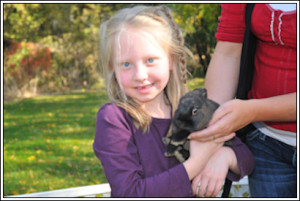The Litchfield Independent Review reports the Minnesota Department of Health is investigating an outbreak of diarrheal illness possibly linked to school students visiting Nelson Farm southwest of Litchfield.
 More than 10 cases of diarrheal illness, including three confirmed cases of Cryptosporidium infection, have been reported from five different schools. In all cases, individuals had taken field trips to Nelson Farm, according to a health advisory issued by the agency May 26.
More than 10 cases of diarrheal illness, including three confirmed cases of Cryptosporidium infection, have been reported from five different schools. In all cases, individuals had taken field trips to Nelson Farm, according to a health advisory issued by the agency May 26.
On the morning of May 26, Department of Health officials visited the farm to tour its facilities, according to Nelson Farm owner Don Nelson.
“Right now we don’t even know if it came from our farm,” he said. “We won’t know until next week (when the test results come back).”
Outbreaks associated with farm animal contact may include multiple pathogens including Salmonella, Campylobacter, Shiga toxin-producing E. coli (STEC), and Cryptosporidium, the health advisory states. The incubation period for these illnesses range from 12 hours to as long as 14 days.
Don said he was informed the evening of May 25 of the possible outbreak, which came as a surprise to both himself and his wife, Sonja.
“We’ve done this for 30 years, and we have never ever have been called on this before,” Sonja said.
“We won’t deny that there is chance we wouldn’t have anything because everything has bacteria,” she added, but emphasized that the Department of Health has not confirmed whether Nelson Farm caused the outbreak.
 Don said Department of Health officials were impressed with the overall state of the farm, noting that they had positive comments on the farm’s hand washing areas and where visitors eat.
Don said Department of Health officials were impressed with the overall state of the farm, noting that they had positive comments on the farm’s hand washing areas and where visitors eat.
“I’m very, very concerned because we want to make it a healthy experience on the farm,” Don said. “That’s our goal.”
Since being notified by the state, Don has called all the schools that visited Nelson Farm since May 9 to see if children have gotten sick, one of which was the School of St. Philip.
Nearly 20 kindergarten, first-grade and second-grade students at the School of St. Philip visited the farm May 23 for their annual spring field trip.
“At this point we have not heard of any instances associated with that outbreak,” Principal Michelle Kramer said.
While on the farm, students toured an old barn, visited animals, played in the hay barn and had lunch at the farm.
“I’m sure we’ll be back at Nelson Farm next year. These things happen, and we have to take every precaution that we can, but we’re not going to cut them out of our school schedule because they have a very great deal to add to our programming here,” Kramer said.
For Don and Sonja, the investigation has become a teaching opportunity in how to prevent the transmission of illnesses.
“Thirty years ago it was our goal to get close to the animals to give the best possible learning experience,” Don said.
Many of the students who are visiting the farm are now more susceptible to diseases than 30 years ago, he explained.
“Our young students don’t play in the dirt as much, not around as many farm animals, generally live in cleaner environments such as schools, homes, businesses, therefore immunity and resistance to diseases is lower today,” Don said.
Another time for Don’s version of the hygiene hypothesis. For now, focus on the kids.
A table of petting zoo outbreaks is available at https://barfblog.com/wp-content/uploads/2016/05/Petting-Zoo-Outbreaks-Table-5-5-16.xlsx
Best practices for planning events encouraging human-animal interations
Zoonoses and Public Health 62:90-99
Erdozain , K. KuKanich , B. Chapman and D. Powell, 2015
http://onlinelibrary.wiley.com/doi/10.1111/zph.12117/abstract?deniedAccess
Educational events encouraging human–animal interaction include the risk of zoonotic disease transmission. ‘It is estimated that 14% of all disease in the USA caused by Campylobacter spp., Cryptosporidium spp., Shiga toxin-producing Escherichia coli (STEC) O157, non-O157 STECs, Listeria monocytogenes, nontyphoidal Salmonella enterica and Yersinia enterocolitica were attributable to animal contact. This article reviews best practices for organizing events where human–animal interactions are encouraged, with the objective of lowering the risk of zoonotic disease transmission.
